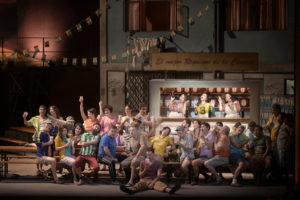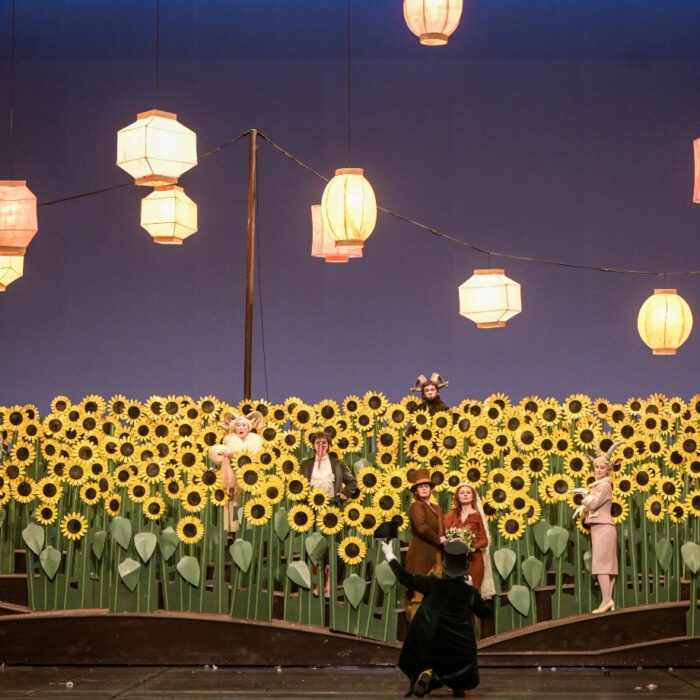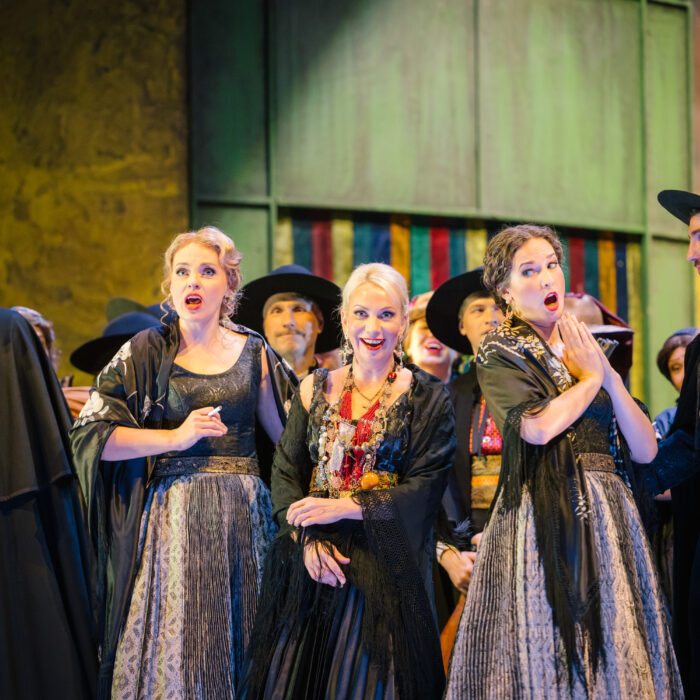
Théâtre des Champs-Elysées 2022-23 Review: La Périchole
Stanislas de Barbeyrac & Marina Viotti Shine in Laurent Pelly’s Questionable Production
By João Marcos Copertino(This review is for performances of Nov. 13 and 14. Performed was the 1874 three–act version of the opera.)
On paper, few performances of Offenbach’s “La Périchole” could be more exciting than this new production at the Théâtre des Champs-Elysées: Laurent Pelly is arguably the director most knowledgeable about Offenbach’s affairs working right now; Marc Minkowski conducting Les Musicians du Louvre is always a great event; a great cast; and French opéra bouffe in Paris. It all promises a night with all the high standards of opera productions in Paris.
Did it deliver on its promises? Yes and no. Few performances have better synchrony between all performers, even the orchestra was scenic. However, Pelly could not fully punctuate some of the operetta’s main anachronisms; in fact, the production sometimes made things worse.
So Much Praise… But
There is much to praise in this production. Pelly modernized the scene, placing the action not in colonial Peru, but during a post-1970s dictatorship. The production has a vulgar and trash aesthetics. La Périchole and Piquillo are punk street singers, and the streets of Lima are occupied with festive people. The dictator/viceroy is a ridiculous figure who seeks grandeur and looks to see himself reflected everywhere: his face is stamped on everything, from images in the great outdoors to mere plastic cups. His palace is made of mirrors to reflect immense portraits, and even the costumes of the noblemen and women are covered with mirrored textures. It is quite a spectacle, and worth seeing live. The great lighting work by Michel Le Borgne, especially in the second act, will not translate so well in video streaming—which is a pity, since it makes the scenarios even better.
The vulgarity of the production, however, has its political limitations. The great sociologist Siegfried Kracauer stressed how much the success of Offenbach’s operettas comes from the Louis Napoleon’s dictatorship (1852-1870). According to him, the end of the dictatorship meant the end of operetta’s zenith. That is particularly true in the case of “La Périchole,” in which it is easy to trace possibilities of a subversive reading of politics. The viceroy of Peru, after all, was not so different from the Second French Empire. However, Pelly’s decision to modernize the action to twentieth–century Peru might miss a few dots in this game. It is not as easy now as it was in 1868—or even 1874—to link an authoritarian South American country to contemporary France. In fact, Pelly’s production seems rather to ratify the view of an insuperable difference between the global north and the global south, as if the latter were the natural place for authoritarianism to flourish.
It is not a question of pure orientalism; a present-day staging of a nineteenth-century opera will always have its anachronisms, and it is quite likely to offend some sensibilities. The issue here, nonetheless, is how much of the subversiveness of the original score of Offenbach (and the text of Meihac and Halévy, of course) is lost in the transposition. It is not the first time that Pelly has showed some political blindness, to say the least. Earlier this season, his “Lakmé” in the Opéra-Comique was more Japanese than Indian, with Kabuki theater make-up and white paper walls. He himself claimed it was a way of endorsing the exotism of Delibes’ work... It is not a question of condemning such approaches out of hand, but rather of trying to understand the staging choices. In other words, one must outline the working assumptions that are in place.
I must say that Antoine Perraud published a very well–informed review in which he claims that one could read Pelly’s staging as a universal critique, encompassing even the “power abuses” of Emmanuel Macron. Opinions on the French president apart—only a very left-wing outlet like Mediapart would connect Macron to a South American dictator—, Perraud is more concerned with Offenbach’s text than with Pelly’s staging itself.
Another aspect that the modernization of the staging could not address properly was how to translate the charisma of La Périchole so that is palpable in this production’s punk street singer. Despite the performers’ best efforts—and all the protagonists physically go above and beyond to make this performance work—, there is something missing in her charm and agency. Do not get me wrong, La Périchole is rather poor, and seemingly prostitutes herself to eat. Nevertheless, if she is a punk singer, one would expect a very strong and rock and roll personality.
The text gives us clues suggesting that she is witty and capable of pulling the strings. When trying to explain her plan to save Piquillo, Périchole states that the viceroy is incapable of refusing her anything because “je lui ai toute refusé” (“I refuse him everything”); she also singsabout how stupid men are. Somehow all this energy from the text does not travel through the dramaturgy. One example of many: In the third act, an old prisoner, trying to free Périchole, sexually attacks her. After she and Piquillo yell at him, he excuses himself saying it has been twelve years… The joke itself, now outdated, is not the problem; are we supposed to believe, however, that punk Périchole would accept such a lame excuse so passively? Would not a slap be funnier?
Problems aside, Pelly and Minkowski’s collaboration has a dynamism and energy essential to making the comedy work. Minkowski conducts Les Musicians du Louvre in fast tempi. The orchestra musicians themselves were in great synchrony with the acting; quite often it was apparent that they sought to see what was happening on the stage, even from the pit (!), so as to coordinate their playing as closely as possible with the action. The comic effect of the orchestra is fully explored when the bolero “Les marins courbaient la tête” is played and sung (!) by the orchestra as an entr’acte between the two tableaus of the final act. It worked out quite well, making everything more bouffe.
Great Scenic Shape
The singers are in great scenic shape. They sing while doing acrobatics that only enhance the comic effect. In these lines, much of this production’s success should be attributed to Stanislas de Barbeyrac. He is the one who does the most scenically—which is to say not a little in this case. In the first act he sings while doing push-ups, jumping, drinking, etcetera etcetera. For those who know his voice, Barbeyrac has a baritone quality in his tone that is quite pleasant when singing comic repertoire, allowing him much expressivity, even though he is not the most agile of tenors. His celebrated aria (“On me proposait d’être infame”) has a different personality in each repetition of the melody, making it quite possibly the highlight of the night.
Moreover, Barbeyrac is comfortable in the role, making even his mistakes interesting. In the performance of November 14, he clearly mistuned a Bb 4 in the first act finale—understandably, since he was singing on his knees on the top of a food truck. However, the way that he followed such misadventure was quite remarkable. He truly took his breath and sung, in a falsetto and in fermata (!), the D5 that follows. It is all written in the score, but even the mistuning sounded as if it was intended to be that way. The falsetto embraced the farse aspect of that infamous marriage scene. It was good acting in the service of the music and vice-versa.
The two mezzo-sopranos who alternate as the protagonists give solid performances. Antoinette Dennefeld has a lighter voice with very distinguishable colors in the high and lower registers. Interestingly, she has more dynamic and vocal control in the most challenging physical moments of the first act. Her drunk arietta (“Ah quel dîner je viens le faire”) was quite something, the voice and the physical gestures complemented each other. Her letter scene—maybe the opera’s greatest highlight—was not as dynamically rich as it could have been, but she had a great performance overall.
Marina Viotti has a richer and darker vocal instrument if compared to her peer. She also delivered a very solid and consistent performance. Especially in the first act, she provided us with very beautiful moments, like her pianissimo in “Dieu que je t’aime” in the letter scene. Her “drunk voice,” in the first act arietta, sounded both beautiful and comically efficient, in a very difficult line to tackle. All night long, her incursions into her voice’s lower register showeda very interesting color and a promising future in lower repertoire.
The role of Don Andres is likewise sung, alternately, by Laurent Naouri and Alexandre Duhamel. It is a bit of a ungraceful role that requires strong acting, and it is not provided with particularly great music. Thankfully both baritones are well-equipped with great stage presence and extremely exaggerated pronunciation of the consonants when singing—which made all the wordplays interesting, though it prevented the resonance in some scenes. It is, nevertheless, a pity that Offenbach’s score offers little in the way of a showcase for the musicianship of Naouri and Duhamel, and their many capacities…
The supporting cast is very effective when acting, and Pelly is quite good in choreographing their appearances on stage. The trio of the cousins/noblewomen, comprised of Chloé Briot, Allix le Saux, and Eléonore Pancrazi, are particularly effective in changing costumes and physicality between the two roles that each of them play. The Choir of Bordeaux Opera works pretty well in making a sonorous sound with much effort in singing the consonants. They too were kept very active physically following Pelly’s frenetic staging.
In spite of its political and aesthetic problems, Pelly’s staging and Mikowski’s musical direction are a showcase of great refinement. In the handling of Offenbach’s “La Périchole,” its strong cast—“distribution d’expection,” as the French say—helps a lot. Nevertheless, in a personal, and final note, “La Périchole” is more pleasant if the listener enjoys operetta as a genre, which might not be the case for this mortal critic.


